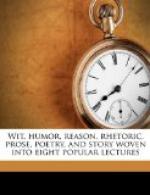Do you say that no such ignominious possibility hangs over any boy in this audience? I tell you it is not always the first, but sometimes the fairest born. I know a man who in his youth drove his father’s fine horses, romped and rested on the richest blue-grass lawn, ate from spotless linen and lived in luxury, who now eats from the bare tables of low saloons, and is often given shelter by an old colored “mammy,” who was once his father’s slave.
I have in mind a schoolmate, whose father lived in a fine country home two miles from the schoolhouse. The influence of my schoolmate’s mother was pure as the diamond dew he brushed from the bending grass in barefoot days. But he left the country home and the last time I saw him he was a vagabond, begging bread from negro cabin doors. Ah! mother, you can’t tell which boy.
In a large city a few years ago a man stood at the side door of a saloon at two o’clock in the morning. His clothes were worn and the matted hair hung about his face. He waited, hoping some one would come along and give him the price of a drink. Two young men, one of them a reporter on a leading daily, came down the street. As they neared the poor fellow, one said to the other: “Did you ever see such an appeal for a drink? Here, hobo, take this dime and buy you one.”
Seizing his hand his friend said: “No, let’s do the job like good Samaritans. Come in, tramp, and have a drink with us.”
The three entered the saloon, the glasses were filled and the tramp took his and draining it, said: “Young men, I’m very thirsty, may I have another?”
“Yes, help yourself,” was the reply, and the tramp took the second drink. Then lifting his hat he said:
“Young men, you call me a hobo, but I see in you a picture of my lost manhood. Once I had a face as fair as yours, and wore as good clothes as you have now. I had a home where love lit the flame on the altar, but I put out the fire and to-night I’m a wanderer without a home. I had a wife as beautiful as an artist’s dream, but I took the pearl of her love, dropped it in the wine glass, Cleopatra-like I saw it dissolve and I quaffed it down. I had a sweet child I fondly loved, and still love, though I have not seen her for twelve years; a young woman now in her grandfather’s home, she is deprived of the heritage of a father’s good name. Young men, I once had aspirations and ambitions that soared as high as the morning star, but I clipped their wings, I strangled them and they died. Call me a tramp, do you? I’m a preacher without a charge, a lawyer without a brief, a husband without a wife, a father without a child, a man without a friend. I thank you for the drinks. Go to your homes and on soft beds may you sleep well; I’ll go out and sleep on yonder bench in the night wind. A few more drinks, a few more drunkard’s dreams, and I’ll go out into the moonless, starless night of a hopeless forever.”




